Etymology and meaning of halitophobia.
This term comes from the combination of 2 words ✌️: "Halitus" and "phobia"... Halitus is a Greek term that refers to bad breath, while the word phobia refers to an irrational fear of an object, living being or situation.
In this way we can understand that the term halitophobia refers to the irrational fear of bad breath.
It should be noted that this phobia encompasses the fear of perceiving one's own or other people's bad breath, in other words, people who suffer from this disease can trigger an extreme panic when they feel a bad smell in their mouth or in other people's mouths 🫢
How common is halitophobia and how many people suffer from it?
It is not an exact figure, but it is estimated that 1% of the world's population suffers from this phobia 🧐... There are currently around 8 billion people on planet Earth, 1% of which equates to 80 million individuals who suffer from the irrational fear of bad breath.
That is to say, out of every 100 people in the world, one suffers from halitophobia 😞
Halitophobia from a psychological perspective.
Being a phobia it is considered as an anxiety disorder and therefore is treated as a mental illness 🤕... When we read the description of this problem we may think that the fear is too exaggerated for the harmless situation that generates it, but this is what identifies phobias ☝️
Before thinking about how illogical a fear can be, we must understand all the consequences that this illness creates in people's lives 😞... They are mental disorders that should be treated by a psychologist and deserve respect regardless of whether we understand their fear or not 😶
Halitophobia in the DSM-5.
The irrational fear of bad breath in the Diagnostic and Statistical Manual of Mental Disorders (DSM-5) is identified as a specific phobia of the "other" type 🧐
This information can be very useful because it allows us to know the danger and other factors that encompass this fear... If you have this mental disorder I have good news for you 😌, it is among the least harmful and easiest phobias to fight.
So don't give up and fight for a life free of irrational fears. I assure you that with the right help you will succeed! 🌟
Who is affected by halitophobia?
As it is a specific phobia it is usually children who suffer from the irrational fear of bad breath but this does not mean that adults cannot have this mental disorder... In short 🤐, anyone can be affected by halitophobia but it is more commonly seen in infants.
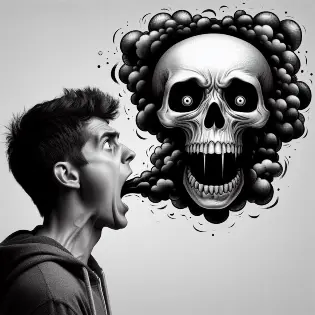
Phobias related to halitophobia.
Anxiety disorders have the terrible effect of being able to generate more mental illnesses and phobias are no exception and are even capable of generating more illogical fears... But they are not created randomly 🙅, in the vast majority of cases all irrational fears are related and those that usually accompany halitophobia are the following:
Cybophobia 🍟: Extreme panic of food.
Alliumphobia 🧄: Fear of the genus allium, such as garlic, onions, chives, scallions, shallots, etc.
Osmophobia or Olfactophobia 👃: Panic of odors.
Agoraphobia 😨: The illogical fear of being in a situation where one's environment is unsafe for the victim.
Social phobia 😶: The irrational fear of any type of social interaction.
The case of this irrational fear is very curious since the trigger of this fear can vary from person to person, some are afraid of people's opinion and others are simply afraid of the smell... This can cause many types of phobias to accompany this illogical fear 🤯
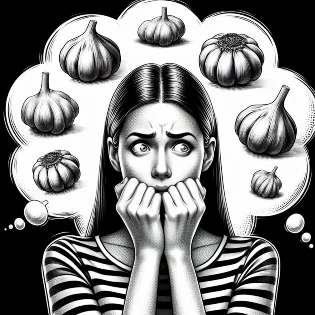
Are halitophobia and obsessive-compulsive disorder related?
Definitely yes, since people who suffer from this anxiety disorder insanely strive to prevent bad breath, thus causing them to have a daily repetitive behavior 🔄
Remember that obsessive-compulsive disorder is characterized by repetitive behaviors that limit the people who suffer from it, as well as generating a lot of anxiety or stress if these routines are not fulfilled 😖, and unfortunately halitophobia is capable of generating this mental problem, as it is very easy to get bad breath.
It is very easy to have bad breath 😅... Sleeping badly, not having proper oral hygiene, breathing incorrectly and many other everyday mistakes can cause this problem.
Ideally, you should be concerned about your hygiene and try to avoid bad breath, but it’s one thing to have the right habits and quite another to spend your whole day stressing about avoiding damaging your breath 🫢
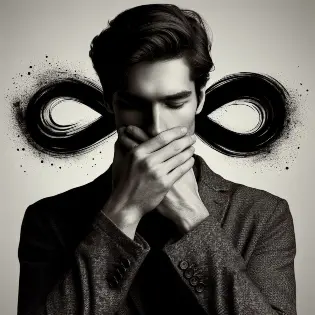
Causes of halitophobia or irrational fear of bad breath.
There are multiple ways to create this mental disorder, but like other phobias can be generalized in 5 common factors that I will explain below:
Trauma 🤕: Experienced events that in some way or another were engraved in our mind and generate negative effects, with halitophobia it could be the harassment for having bad breath or the shame of having kissed someone and that this person has felt disgusted by the lack of hygiene for example.
Bad parenting 🐣: Parenting plays a fundamental role in the creation of our self-esteem and personality, if it is taught incorrectly it can generate catastrophic damage to our being... An over demand for oral hygiene or an exaggerated reprimand for having bad breath can easily generate halitophobia.
Fear of being judged by others 👁️: In some cases it is not necessary to live through a traumatic event or have a bad upbringing, many people can generate this irrational fear of being humiliated or discriminated against for having bad breath, although it should be noted that this factor is often accompanied by low self-esteem or some other mental disorder.
Genetics 🧬: Some psychological factors can be inherited (although it sounds unbelievable) and unfortunately susceptibility to mental disorders is one of them... In this case there are not many examples to present, many people could have created this phobia by the simple fact of having bad genetics.
Prolonged stress 😡: Mental disorders weaken you psychologically and make you more susceptible to other problems... If you suffer a lot of stress you can more easily create this irrational fear, it may not be the main cause to generate this phobia but it does promote its creation.
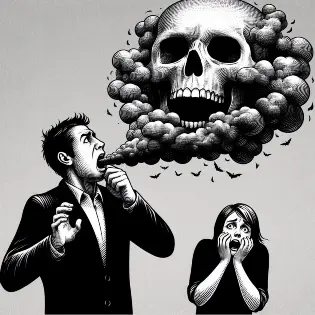
Signs, triggers and complications of halitophobia.
This irrational fear, like other phobias, can affect us in multiple ways; it not only produces anxiety 😶... Halitophobia can generate changes in our behavior, mental and even physical problems.
For this reason we divide the symptoms into 3 sections, so you can understand the danger of this irrational fear in different aspects of life 🧐
Behavioral symptoms of halitophobia
- Avoidance of people with bad breath 🤐
- Over-worrying about bad breath.
- Excessive use of toothpaste, mints and other means to improve breathing 🫧
- Avoidance of eating breath that leaves a bad odour.
- Not eating in public 🍕
- Keeping a distance from people when conversing.
- Excessive brushing of teeth or abuse of other methods of oral hygiene 🪥
- Avoid talking while facing a person and direct your breath in another direction.
- Do not communicate unless you are away from people 🤐
These types of negative effects may not seem harmful but they can really limit your life in many ways... Just imagine limiting your ability to talk, meet new people, eat a meal or waste hours on unnecessary cleaning of your mouth 😕
It may not cause instant pain but in the long run it will lower your quality of life if you allow this irrational fear to control you.
Physical symptoms of halitophobia.
- Palpitations 💓
- Sweating.
- Dry mouth 👄
- Dizziness or nausea.
- Abnormal breathing 😤
- Trembling.
- Chills 🥶
- Chest pain.
- Headache 🤕
- Discomfort.
It is surprising how an irrational fear is capable of generating so much physical pain in the person who suffers it, but it is so 😕, the simple fact of being a mental illness does not imply that it cannot generate physical manifestations 🤷
Mental symptoms of halitophobia.
- Anxiety 😩
- Depression.
- Obsessive-compulsive disorder 🔄
- Low self-esteem.
- Increased susceptibility to mental disorders 🤒
- Stress.
- And obviously an irrational fear of bad breath of others or oneself 😱
The most harmful problems in the long term, those that despite not generating a negative effect on our body are capable of ruining people's lives 🙁... Many do not take into account that suffering from a mental disorder makes you psychologically weaker and thanks to this it is much easier for you to get another illness of this style, making it possible for you to fill yourself with disorders over time 😵
Triggers of halitophobia.
- Sensing bad breath from a person or from ourselves 🤢
- Eating dishes with odor-causing ingredients such as garlic.
- Eating in public 🍟
- Not brushing your teeth or not being able to wash your mouth with water.
A trigger is any event that can "activate" this irrational fear, which is why they feel as if they are the opposite of the behavioural symptoms, as people with this mental disorder will do everything possible not to provoke it... And it is obvious 🤷, if bad breath causes you so much panic, the most natural reaction is to escape from it.
Complications of halitophobia.
- Obsessive-compulsive disorder.
- Anxiety.
- Headache.
- Stress.
- Chest pain.
A complication is a negative effect coming from a disease, with the particularity that it hinders the cure or diagnosis of the same... Under this concept literally all the symptoms of this irrational fear can be complications 🥴
Imagine that you don't want to go to a psychologist just because you ate a dish of garlic without knowing it, literally a behavior that seemed harmless prevented you from progressing in your recovery and so examples can be made with the other symptoms to turn them into complications 😵💫
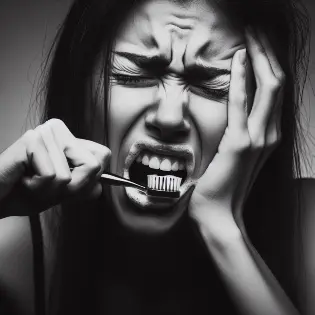
How to overcome the irrational fear of bad breath or halitophobia?
It really is an "easy" phobia to combat as it is of a specific type but the best way to cure any mental disorder will always be to go to a psychologist.
Don't make the big mistake of self-medicating by googling 🫠, phobias are complex illnesses that require a professional to cure... Acting carelessly can lead to addictions or even a much greater fear than the one you actually have 🫤

Therapy, treatment or cure for halitophobia.
You already know that the best way to overcome this irrational fear would be to go to a psychologist, but you are probably wondering what practices I would use to cure you, how I would evaluate you and so on 🧐
And I'm here to answer all those questions, so let's answer them 🤓:
Evaluation or diagnosis of halitophobia.
This test is based on a long talk in which the psychologist asks questions about your fear and the experiences you have lived through because of it 🤕... In many occasions patients can confuse their mental disorders with phobias or even, apart from their irrational fear, they have more psychological problems that need to be treated urgently.
For these reasons it is so important to make a preliminary assessment before any treatment, firstly the examination will determine which therapy is the most effective for you and secondly, it will identify all the problems that you may have 🧐
But what guidelines do psychologists use to determine if a person suffers from a phobia? Let's find out 🤓:
The intensity of the fear 😱: At this point the psychologist defines how irrational the fear is in relation to the situation in which it is presented... For example, having bad breath may make you a little uncomfortable but it should never incapacitate you or generate extreme anxiety.
Anticipatory anxiety 😖: As its name suggests, it refers to generating anxiety before even going through a bad moment... I mean, imagine that you start talking to a person and in an instant you start to worry about having bad breath even though you don't have it or something has not happened to prove it.
Avoidance 🙅: Phobias generate avoidance behaviors towards their fear, for this reason in this section of the evaluation the psychologist checks if you avoid your fear excessively... In the case of halitophobia it could be wasting hours cleaning your mouth, not eating in public or even avoiding at all costs talking near another person.
Daily activities 📅: This guideline refers to how much you’re irrational fear affects your daily life... For example, not communicating with other people because of the fear of bad breath can be very detrimental socially on a daily basis.
It is worth noting that halitophobia is generally recognized as a "specific" type of phobia, so it does not usually have as great an impact on people's lives as other irrational fears... But that does not mean that you should not make an effort to cure it, it is an anxiety disorder and should be treated as such 😶
Cognitive behavioral therapy for halitophobia.
This treatment seeks to change your way of thinking and behavior through long talks that allow the patient to question the illogical thoughts that are damaging their lives 🤕
For example, many people who suffer from this irrational fear exaggerate the importance of the opinion of others... With this methodology they can change their way of thinking and thus reduce the fear that their phobia generates 😌
Exposure therapy for halitophobia.
The procedure consists of exposing the patient to his fear in a very light way, with the aim of getting him used to it and overcoming his anxiety disorder (with a progressive exposure of course) ✊
In the case of this irrational fear the psychologist could come in some sections with bad breath 🤢, in order to talk to the victim at moderate distances, as the patient becomes less upset by his fear, the distance between the two could be decreased... To the point where the patient can have normal conversations regardless of whether there is bad breath or not 😌
Eye Movement Desensitization and Reprocessing (EMDR) therapy for halitophobia.
Did you know that eye movement makes our mind more rational 🤔? This is the principle on which this method is based... It is applied in almost the same way as cognitive behavioral therapy with the big difference that the psychologist asks you to follow the hand or object in movement that is available to you with your gaze.
It seems hardly credible that by having our eyes moving we become more logical but that's how it is and it is even a therapy that is used with many mental disorders such as post-traumatic stress... In the case of this irrational fear it is simple 🤷, you talk about bad breath while your eyes are moving.
A super simple and effective practice 😎
Hypnotherapy for halitophobia.
It consists of bringing the patient into a state of deep relaxation and concentration through multiple techniques such as eye movement 👀, in order to change your behavior and way of thinking in a more effective way.
It is identical to cognitive behavioral therapy with the big difference that before having the talk that changes the patient's mentality, the patient must be immersed in a state of relaxation that allows him/her to be more manipulable 💆
Relax, you will not lose consciousness or be a puppet of the hypnotist, hypnotherapy is a super safe practice and would otherwise be illegal 😅
Virtual reality exposure therapy (VRET) for halitophobia.
The same logic of exposure therapy applies with the additional use of virtual reality technology to facilitate the exposure of the fear in a safe environment... But in the case of this irrational fear it is not usually used 😶, as bad breath is a very easy fear to expose, it would be much cheaper and quicker for the psychologist to eat a dish with a lot of garlic in it 🫠
Medications for halitophobia.
I know that using medication is the easiest and quickest option to combat illness but mental disorders weaken you psychologically and make you more susceptible to addictions 😨... Don't buy anything unless a psychologist has prescribed it for you!
Although it is my duty to inform you but please note my previous warning... Psychologists usually prescribe beta-blockers, anxiolytics and selective serotonin reuptake inhibitors (SSRIs).
But this depends very much on the patient and the level of their anxiety disorder 😶
Relaxation techniques for halitophobia.
As its name suggests, it is based on using various tools to promote our relaxation, from practicing yoga or another sport to learning more complex techniques such as mental anchoring 🧠... I really recommend the latter option, which is based on associating a simple action with a positive state of mind.
For example, every time you feel a bad breath you could practice closing your hand and remembering a moment that causes you a lot of calm, in order to calm down in that situation of course 💆... Relaxation techniques need time and care but I assure you that they are a great tool for phobias and life in general.
Prognoses for halitophobia.
Thanks to the fact that this irrational fear is a specific type of phobia, the chances of overcoming this anxiety disorder with the help of a psychologist is about 70% to 90% successful 😮... In other words, you will most likely overcome halitophobia if you see a psychologist 🥳
Don't give up on yourself and don't look for ways to live with this problem, you can overcome this adversity and enjoy a pleasant life 💜
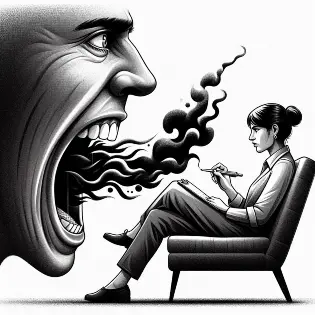
Frequently asked questions about halitophobia
Quick Q&A for those who don't want to read too much:
It is known as halitophobia 🤓
It comes from the Greek word "halitus" and "phobia", the former referring to bad breath and the latter to an irrational fear.
About 1% of the world's population suffers from this irrational fear, that is, every 100 people 1 suffers from this anxiety disorder 🤓
It is considered to be a specific phobia of the "other" type.
Yes, because this irrational fear encourages you to engage in repetitive behaviors that help you avoid bad breath at all costs 🤐
It makes you more susceptible to other mental disorders and also represents a major handicap socially.
Trauma, poor parenting, criticism, prolonged stress and in some cases genetics can create this irrational fear 😶
Yes, like any other phobia it can generate anxiety and panic attacks.
We all feel discomfort when we feel our own or someone else's bad breath but it should never be a source of disabling stress, we just need to be logical to be able to differentiate them clearly 🫣
You probably won't like my answer but just go to a psychologist, it's the safest, most effective and quickest option.
It depends a lot on the patient 😶, as each therapy adapts better or worse depending on the person, but from my perspective it is exposure therapy as it is usually the final test to verify if you overcame your irrational fear of bad breath 🫢
70% to 90% with the help of a psychologist, a really encouraging percentage if you have this anxiety disorder and you are likely to overcome it with the right help.
Don't buy medicine for this irrational fear, it is not recommended and the best way to go is to attend some therapy with a psychologist... Don't buy medicine like crazy, you can become addicted and I assure you that nobody wants that 🙅
Take care of your oral hygiene in a reasonable way without going to extremes and above all, see a psychologist... I assure you that it will be an action that will help you a lot.
None, don't consume crazy stuff from the internet and see a psychologist! It is the surest way to overcome this anxiety disorder 👍
Check if this is happening again and if it is becoming more frequent, see a psychologist, you could be generating halitophobia and the quicker you deal with it the less damage you will receive from it.
